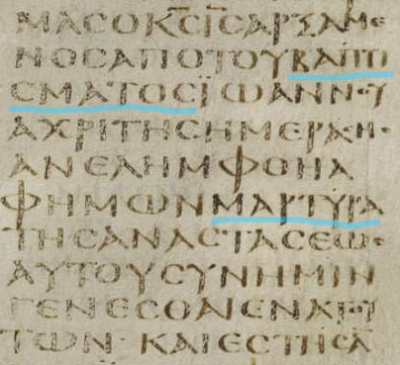As I mentioned, I thought we should start moving more quickly through Acts, so I am taking the verses in bigger bites. My plan is to
1 Begin with an idiomatic English translation of the verses in question.
2 Then type out the Greek in phrases, following each phrase by a mostly word-for-word English translation.
3 Add comments on grammar and vocabulary, with emphasis on difficulties in translation.
So off we go - note that if a post gets too long, I may split it up.
Acts 1:23-26:
23 So they proposed two: Joseph called Barsabbas, also known as Justus, and Matthias.
24 And they prayed, “You, Lord, know everyone’s heart. Show us which of these two you have chosen
25 to take up this portion and apostleship, which Judas abandoned to go to his own place.”
26 Then they cast lots, and the lot fell to Matthias; so he was added to the eleven apostles.
23 Καὶ ἔστησαν δύο, . . . . . and they set up two
Ἰωσὴφ τὸν καλούμενον Βαρσαβᾶν, . . . . . Joseph the one called Barsabas
ὃς ἐπεκλήθη Ἰοῦστος, . . . . who was called Justus
καὶ Ματθίαν. . . . . and Matthias.
24 Καὶ προσευξάμενοι εἴπον, . . . . And having prayed they said
Σὺ κύριε καρδιογνῶστα πάντων, . . . . "You Lord knower of hearts of all
ἀνάδειξον ὃν ἐξελέξω, . . . . show whom you chose
ἐκ τούτων τῶν δύο ἕνα . . . . out of these of the two one
25 λαβεῖν τὸν κλῆρον . . . . to take the portion
τῆς διακονίας ταύτης . . . . of the ministry this
καὶ ἀποστολῆς, . . . . and apostleship
ἐξ ἧς παρέβη Ἰούδας, . . . . from which turned aside Judas
πορευθῆναι εἰς τὸν τόπον τὸν ἴδιον. . . . . to go into the place the one his own
26 Καὶ ἔδωκαν κλήρους αὐτῶν, . . . . And they gave lots of them
καὶ ἔπεσεν ὁ κλῆρος ἐπὶ Ματθίαν, . . . . and fell the lot upon Matthias
καὶ συγκατεψηφίσθη . . . . . and he was voted with
μετὰ τῶν ἕνδεκα ἀποστόλων. . . . with the eleven apostles
We'll leave off for now; in the next post - verbs and other grammar and vocabulary of these verses.





